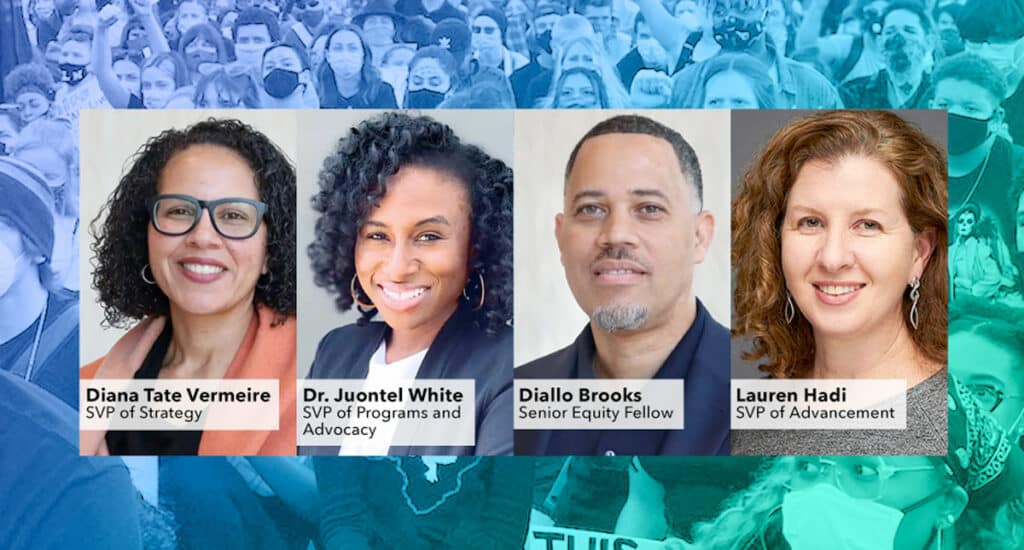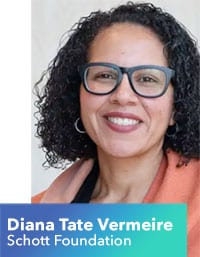Philos Issue 5
A Full Court Press: Making Bold Moves for Racial Justice in the Face of Uncertainty

 Last month, the U.S. Supreme Court outlawed affirmative action in higher education. While the decision is troubling, it should not impede the important work of foundations and nonprofits working towards a more just and equitable country. We must be bold, strategic and smart, but not over-compensate in ways that thwart our progress.
Last month, the U.S. Supreme Court outlawed affirmative action in higher education. While the decision is troubling, it should not impede the important work of foundations and nonprofits working towards a more just and equitable country. We must be bold, strategic and smart, but not over-compensate in ways that thwart our progress.
This decision does not take away the country’s moral imperative (and existing legal framework) to fight discrimination. Affirmative action was one important tool to address the harms done by this country to Black and other people of color. If philanthropy invests in a winning strategy, over the long term, we can reach our goals.
This issue features an interview with Diana Tate Vermeire, attorney and Schott’s Senior Vice President of Strategy. Schott team members also provide related insights on grantmaking, advocacy, and the role of intermediaries, and I offer three action items for funders.
In solidarity,
Susan Taylor Batten
President & CEO, ABFE
Member, Schott Foundation Board of Directors
The Philos Interview
Schott: Before joining the Schott Foundation, you litigated civil rights issues under California’s Proposition 209 and held the role of the Vice President for Inclusive Excellence at California State University-Sacramento. Given your unique vantage point, how do you feel SFFA v. Harvard will affect higher education, both in terms of the letter of the law and universities’ broader institutional cultures?
 Diana Tate Vermeire: SFFA v. Harvard will have a profound impact on higher ed because the internal discussions have shifted further away from directly addressing root causes to more of a defensive posture. Others are taking an aggressive posture, namely, those opposed to equitable access or the celebration of identities and lived experiences, have ramped up their advocacy of regressive policies.
Diana Tate Vermeire: SFFA v. Harvard will have a profound impact on higher ed because the internal discussions have shifted further away from directly addressing root causes to more of a defensive posture. Others are taking an aggressive posture, namely, those opposed to equitable access or the celebration of identities and lived experiences, have ramped up their advocacy of regressive policies.
Those of us committed to equity and justice will need to tap into our continued resolve and provide strength to one another to continue our long-fought struggle. Crafting policies and practices to address racism without one of the most direct and honest paths — explicitly mentioning race — will be more difficult, but far from impossible. Vision and creativity are needed now more than ever.
The letter of the law is only narrowly construed to prohibit race-conscious decision making in university admissions (with the notable exception of military institutions). However, many are already using this decision to advocate for changes that go far beyond its reach.
Therein lies the true damage of the decision, which is the chilling effect and fear that it may place on those who seek to comply with the decision – as ill-founded and unjust as it may be – while also trying to advance towards equity and justice in all aspects of life in the United States.
I am concerned that the impact will lead to regressive practices throughout university operations, whether it be related directly to admission, or more broadly to cultural competence in the lecture halls; affinity/identity spaces, clubs, and organizations on campus; university sponsored or supported programming or speakers; and institutional decision making related to allocations of budgets, resources, campus space, recruitment and retention of underrepresented faculty and staff, among many others.
Despite all this, I am confident in the commitment of like-minded individuals and colleagues who will continue to advocate for and ensure equitable access, inclusive practices, and the mitigation of historic and present discrimination and oppression. We have seen this dynamic already in places like California, Michigan, and others, and there is much we can learn from those experiences.
Schott: A lot of ink has already been spilled analyzing the Court’s decision. Through your own reading of the opinion and coverage you have read, what are some of the key takeaways that philanthropy should keep an eye on in the short term?
Tate Vermeire: Philanthropy should be clear that the immediate impact of the decision on affirmative action is limited to race-conscious admissions decisions in higher education and nothing more.
Yet, we must also be clear that the efforts to undercut or dismantle race-conscious decision making will not stop with higher education. It will expand out into many facets of life in the United States and those efforts have already begun.
In the short term, philanthropy must implement and develop new tools designed to address inequity, structural racism, and the enduring legacy of white supremacy. We must do so strategically with the understanding that challenges will eventually come, and with the creativity to develop and test new approaches that affirm race-consciousness as well as those that advance equity and justice by other methodologies.
Schott: The concurring opinion by Justice Gorsuch suggests a willingness by at least some on the court to expand their interpretation of the anti-discrimination section to other titles of the Civil Rights Act — including Title VI, which covers any programs that receive federal funding. In the face of further potential dangers on the horizon, how can funders use this moment to lean into bolder strategies rather than fall back on our heels?
Tate Vermeire: There are many who want the SFFA v. Harvard decision to be the decisive moment when the United States begins to systematically roll back its commitment to equal opportunity.
If we are not careful, it will be the defining moment for the erasure of our efforts to ensure full access and opportunity to all.
At minimum, funders should stay the course and remain committed to their own organization’s diversity, equity and inclusion efforts but also in their grantmaking, investment strategies and decision making. In doing so, funders should assess their processes and practices in order to mitigate as much risk as possible, while still executing on your commitment to racial justice and equity.
Resist the urge to allow your efforts or advocacy to be chilled by the threat posed by the Supreme Court or others who are committed to dismantling the levers of progress.
If funders want to be bold in this moment, they will fund grassroots movement builders and organizations committed to racial justice: supporting those community voices and perspectives often left out of solving our most pressing problems, despite being the ones most directly impacted.
In the face of harmful decisions handed down from the top, let us fuel resilience and renewal from the bottom up.
In funding these groups, grantmakers can be doing so in at least three ways:
- First, provide general operating funds with as few – if any – requirements and limitations on how funds will be used, allowing for the greatest flexibility and responsiveness.
- Second, provide support to ensure the health and wellbeing of advocates, often in direct confrontation with those who seek to further oppress and marginalize them.
- Third, make grants in collaboration with others and set aside resources to defend against the kinds of legal challenges the Gorsuch concurrence portends. Where possible, proactively advance legal and legislative strategies to neutralize and head off those attacks.
Many leaders at all levels of philanthropy are committed to these efforts and are building community and developing strategies to advance these efforts. Now is the time to join together and double down on equity, inclusion, opportunity, and justice considering these attempts to turn back progress.
Insights from the Schott Team
Ignite Collective Action Dr. Juontel White, Schott Senior Vice President of Programs
Dr. Juontel White, Schott Senior Vice President of Programs
The power of grassroots organizations lies in their ability to ignite collective action amid the swings of political and economic change. It is an advantage they wield during and beyond times of crisis.
The recent Covid-19 crisis, SCOTUS repeals of affirmative action and abortion rights, and the nation’s racial awakening and uprisings have intensified the enduring fight for racial and social justice. In response, grassroots organizations are doing more than ever to stand up winning campaigns at every level of government, grow their base, and even expand their focus issues to meet the moment.
The philanthropic community has a key role to support grassroots organizations and movements in response.
The Schott Foundation centers grassroots organizations and is increasing resources for groups in the South, where most of the state-level legal repeals and political battles in education and beyond are happening.
To help grassroots organizations in the fight for justice amid increasing political attacks, we as a philanthropic community can increase funding, technical assistance, and leadership development to sustain the necessary work of grassroots organizing.
Remove Obstacles to Advocacy, Lobbying and Civic Engagement Diallo Brooks, Schott Senior Equity Fellow
Diallo Brooks, Schott Senior Equity Fellow
The recent Supreme Court ruling calls for bolder and more urgent action from philanthropy. We need to have honest and meaningful conversations that lead to allocating more resources for racial justice. Those resources should support advocacy, lobbying and civic engagement.
We should also keep investing in removing obstacles to voting and empowering more under-resourced BIPOC communities to participate in elections. The federal elections affect the ideological composition of the federal judiciary reinforcing the need for advocacy and lobbying efforts focused on the US Senate’s federal judicial nominations responsibilities.
Philanthropy must step up its commitment to these vital areas of work.
Utilize Intermediaries to Move Funds Where They’re Needed Most Lauren Hadi, Schott Senior Vice President of Advancement
Lauren Hadi, Schott Senior Vice President of Advancement
When we and other intermediaries sustain investment in grassroots organizations, grantees’ efforts have a significant impact on local and state policies, especially in places such as New York, Massachusetts, North Carolina, Little Rock, and Jackson, Mississippi.
Despite the recent decisions of the Supreme Court, philanthropy needs to double down on its investments in racial justice work – we need to continue to fuel the grassroots movement to build the power of those who are on the frontlines in their communities.
This is critical for children and families and is vital for our democracy.
Intermediaries play a key role in their ability to pool and leverage funds from a variety of donors to ensure the groups on the ground have funding that is consistent and reliable.
An intermediary can strategically bundle resources to disseminate to grantees year after year. In moments of urgency, intermediaries are also positioned to move funds to the field quickly because they know who is doing the work and have a direct line of communication to better understand what the needs are. And, for funders who may want to keep a low profile, granting via intermediaries can offer greater anonymity when desired.
 Susan Taylor Batten, President & CEO, ABFE
Member, Schott Foundation Board of Directors
Susan Taylor Batten, President & CEO, ABFE
Member, Schott Foundation Board of Directors
- Move forward on your racial equity and justice work in support of communities of color. Ensure that this work is backed by data that demonstrates the racial inequities and/or disproportionality you are looking to address (i.e., education, criminal justice, health disparities, etc.). Clarify how racial equity is good for the country and move forward with all deliberate speed!
- Ramp up investments in power building and civic engagement in communities of color through long-term funding strategies (including endowments). Judges make their way to courts via elections – they are either elected by a constituency or appointed by an elected person/body. Philanthropy must substantially increase efforts to support voting and voter access. And our investment strategies must be able to withstand current and future attacks on this work. This is a long game. The Schott Foundation for Public Education advocates for creating endowments to support power-building nonprofits across the country; now is the time to organize investments for civic engagement groups in ways that match the level of threat we are facing.
- Continue to collect racial ethnic data on foundation grantees. This data is important to help funders understand the racial impact of their funding decisions, grantmaking polices, etc. We may need to rely on this data moving forward to demonstrate the need for “targeted universalism;” the setting of universal goals for all communities and using targeted processes to achieve those goals. This naturally includes foundation funding that is accessible for all communities, but in different ways.

